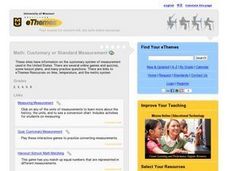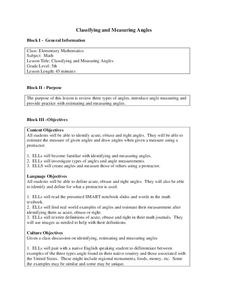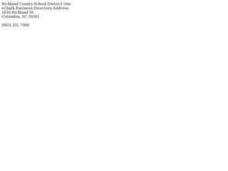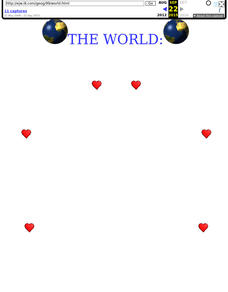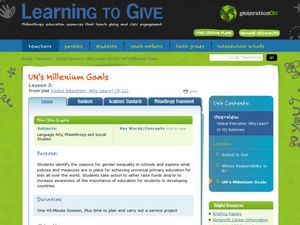Teach Engineering
Bone Density Challenge Introduction
Can you use X-rays to measure bone mineral density? This is the essential question that learners must answer in the first installment of a seven-part series. They brainstorm ideas about necessary background information and what they...
Albert Shanker Institute
Economic Causes of the March on Washington
Money can't buy happiness, but it can put food on the table and pay the bills. The first of a five-lesson unit teaches pupils about the unemployment rate in 1963 and its relationship with the March on Washington. They learn how to create...
Curated OER
Basic Measurement for Welding
Students accurately measure pieces of metal. After reviewing basic math principles, groups of students identify proper and safe use of measuring devices. They discuss the safety procedures for other devices in the classroom. After a...
Curated OER
Measuring the Classroom
Learners measure their classroom and determine the area. They discuss the margin of error. Each class member will write up their results separately. Students must decide what measurements to make, and attempt to measure accurately.
Curated OER
Time Zones in the United States
Eighth graders explore how to use the time zones in the United States and internationally. They use elapsed time to solve problems. Students calculate the time in various places in the United States. They discuss the 6 time zones in the...
Curated OER
USING YEAST AS AN ULTRAVIOLET LIGHT MEASUREMENT TOOL
Young scholars realize the importance of organisms as standards of measurement and experimentation.The first lab is a simple survival curve that demonstrates the effects of UV light on cells. The second lab looks at repair mechanisms of...
Curated OER
Math: Customary or Standard Measurement
Students examine resource links to examine types of measurement. They play interactive games to practice conversion. They inspect digital and analog clocks as well as the three temperature scales,
Curated OER
Significant Figures and Measurement
In this science worksheet, students draw several markings on a ruler or graduated cylinder or thermometer to get each of the correct measurements. Then they state what place the marking indicates and the number of significant figures in...
Curated OER
Classifying and Measuring Angles
Fifth graders explore the three types of angles. In this math lesson, 5th graders estimate the measure of angles and draw the angles using a protractor.
Curated OER
Measure the Angle
Students measure angles. In this angle lesson, students draw angles. They use a protractor to measure angles and identify the angle as straight, right, acute, or obtuse.
Curated OER
How Many Fingers?
In this math worksheet, students use non-standard measurement to measure 5 classroom items and record the data. Students use their fingers and then ask a classmate to do the same. Students compare the data and answer 2 questions about...
Curated OER
Measurement
Seventh graders measure surface area. In this geometry lesson, 7th graders find the surface area of various geometrical shapes. Using a computer program, students compute the area of 2-D and 3-D shapes. Students use...
Curated OER
The World (With an emphasis on the United States)
Fourth graders recognize the different continents. They are introduced to longitude and latitude and how to find locations using these measurements. This series ends with an emphasis on the fifty states of the United States and their...
Curated OER
How Close Is Our Estimate?
Fifth graders estimate perimeter, area, and volume. They measure perimeter and area using nonstandard units of measurement. Students add and subtract non-standard units of measurement. They add mixed numbers and simplify the sum.
Curated OER
Area Lesson Plan
Students manipulate a variety of materials and computer applets in order to explore area and the units used to measure it.
Curated OER
Inventors Unit Survey
Students develop and conduct a survey for their inventors unit. They create a five question survey and tally the survey results, and create a graph using Microsoft Word and Graph Club 2.0.
Curated OER
Are You Full of Hot Air?
Explore the concept of measuring and recording circumference. In this physical science and measurement lesson, young learners blow up balloons, measure the circumference, and record the data on an interactive graphing website.
Alabama Learning Exchange
The Water Cycle
Learners identify the stages of the water cycle. They listen to the book "Magic School Bus: Wet All Over," examine the Build Your Own Water Cycle website, predict and measure the amount of water in a jar for a week, and read a short play...
Teach Engineering
How Big? Necessary Area and Volume for Shelter
Teams must determine the size of cavern needed to house the citizens of Alabraska to protect them from the asteroid impact. Using scaling properties, teams first determining the number of people that could sleep in a classroom and then...
Virginia Department of Education
Out of the Box
There's no need to think outside the box for this one! Scholars measure the length, width, and height of various boxes. Results help develop the formulas for the surface area and volume of rectangular prisms.
Curated OER
Come Fly with Me . . . Open a Book: Travels through Literature
This detailed overview of a curriculum unit suggests using travel literature to engage and stimulate your third graders’ interest in reading. The suggested reading list includes fiction and non-fiction materials and offers urban children...
National Wildlife Federation
Massive Migrations
Turn your students into flocks of migratory birds for this fun lesson on animal migration. Prior to the activity, the teacher creates four different migration routes in the classroom or any available open space, labeling nesting...
Curated OER
UN's Millennium Goals
Whose responsibility is it to improve schools in developing countries? How does quality education affect my neighborhood? Questions of responsibility, whether global or local, form the heart of this activity. Using the UN’s Millennium...








